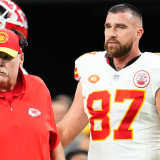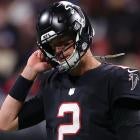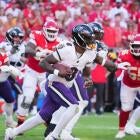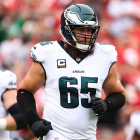Agent's Take: Matt Ryan tops NFL's biggest individual dead money cap charges of 2022
Teams are still paying big-time for these players no longer on their roster

Dead money is a salary cap charge for a player who is no longer on a team's roster. It exists because of how salary cap accounting rules operate.
Signing bonuses, option bonuses and certain roster bonuses are prorated or spread out evenly over the life of a contract for a maximum of five years. When a player is released, traded or retires, the remaining proration of these salary components immediately accelerate onto his team's current salary cap.
There are two major exceptions to this general rule of bonus proration accelerating. Only the current year's proration counts toward the cap with players released, traded or retiring after June 1. The bonus proration in future contract years is delayed until the following league year, which typically begins in early-to-mid-March.
A team can also release two players each league year prior to June 2 (known as a post-June 1 designation) who will be treated under the cap as if released after June 1. With a post-June 1 designation, a team is required to carry the player's full cap number until June 2 even though he is no longer a part of the roster. The player's salary comes off the books at that time unless it is guaranteed.
This means dead money is typically a sunk cost where money isn't owed to a player. A payment is associated with dead money when there are salary guarantees at the time of release or departure comes after the player has already begun receiving a portion of his compensation in that particular league year.
Excessive dead money can inhibit a team's ability to field a competitive team. The salary cap room needed to be active in free agency or give contract extensions to important players on the team shrinks.
There are 19 players with at least $10 million in dead money for 2022. Here's a look at the players responsible for the 20 largest amounts of dead money this year.
Potential dead money subject to a grievance is not included in the calculations. Neither are potential expenses from termination pay since a player must submit paperwork during a small timeframe right after the regular season ends in order to collect. The NFL Collective Bargaining Agreement's $295 daily amount for participating in a team's voluntary offseason workout program is also included in dead money when applicable.
Under this definition of dead money, the $12,826,820 cap charge the Eagles have for using a post-June 1 designation on Fletcher Cox isn't included because he was re-signed to a more cap friendly contract a couple of weeks later. If Cox had signed with another team, he would be among the 20 players.
QB Matt Ryan (Falcons): $40.525 million
The record for dead money the Eagles set with Carson Wentz last year at $33,820,611 was shattered when the Falcons traded Ryan to the Colts for a 2022 third-round pick in March. Ryan had the NFL's most leveraged contract thanks to four contract restructures for salary cap purposes since becoming the NFL's first $30 million per year player on a five-year, $150 million extension in 2018.
The first restructure took place in March 2019 when $8.75 million of Ryan's 2019 base salary was converted into signing bonus to create $7 million of immediate cap space. Ryan's 2020 through 2023 cap numbers each increased by $1.75 million in the process.
The second restructure occurred in December 2019 right before the end of the regular season. $12.5 million of Ryan's 2020 base salary was turned into an option bonus where his 2023 contract year became an option year that was picked up the following March. This maneuver cleared $9.375 million of 2020 cap space while raising Ryan's 2021 through 2023 cap numbers each by $3.125 million.
A third salary conversion was done in March 2020. $6.95 million of Ryan's 2020 base salary was converted into signing bonus. Ryan's 2020 cap number further decreased by $5,212,500. His 2021 through 2023 cap number each increased by $1,737,500.
The last restructure took place in March 2021. $21 million of Ryan's 2021 base salary became a fully guaranteed roster bonus to give the Falcons $14 million of immediate cap relief. Ryan's 2022 and 2023 cap numbers jumped by $7 million each to become $48,662,500 and $43,612,500, respectively. Ryan had the NFL's largest cap number for 2022 prior to his trade.
The Falcons were planning on restructuring Ryan's contract for a fifth time before a failed pursuit to acquire Deshaun Watson via trade. Ryan decided a fresh start was best after the Falcons tried to replace him.
The Falcons picked up $8,137,500 of 2022 cap room by moving Ryan. His $43,612,500 2023 cap number also came off Atlanta's books with the trade.
QB Russell Wilson (Seahawks): $26 million
Wilson got the change of scenery he desired by waiving his no-trade clause. He was dealt to the Broncos with a 2022 fourth-round pick for 2022 and 2023 first-round picks, 2022 and 2023 second-round picks, a 2022 fifth-round pick and multiple veteran players (tight end Noah Fant, defensive lineman Shelby Harris and quarterback Drew Lock) in March. Wilson had two years left on the four-year extension he signed in 2019 containing a then record $65 million signing bonus, which accounts for the $26 million in dead money, when he was traded. The Seahawks picked up $11 million of 2022 cap space by moving Wilson.
EDGE Khalil Mack (Bears): $24 million
Mack established a new record for dead money with a non-quarterback. The Bears sending Mack to the Chargers for a 2022 second-round pick and a 2023 sixth-round pick was the first sign new general manager Ryan Poles was rebuilding after a 6-11 record in 2021. The six-year extension Mack signed in 2018 that made him the league's highest paid non-quarterback at $23.5 million per year when acquired from the Raiders runs through the 2024 season. There would have been just $6.8 million of dead money from Mack's original $34 million signing bonus without contract restructures in 2019 and 2021 where $13 million and $15 million were converted to signing bonus to create cap room. A voiding/dummy 2025 contract year was added in the 2021 contract restructure.
QB Deshaun Watson (Texans): $16.2 million
Watson's divorce this year from the Texans was inevitable. He demanded a trade from the Texans early in the 2021 offseason despite signing a four-year, $156 million extension which had a $27 million signing bonus several months earlier. The numerous sexual assault and misconduct allegations Watson was facing made a trade in 2021 a practical impossibility. By mutual agreement, Watson was kept on the Texans' 53-man roster in 2021 where he was paid his full salary although he wasn't in uniform for games and didn't practice with the team. Watson (and a 2024 sixth-round pick) was dealt to the Browns for 2022, 2023 and 2024 first-round picks, a 2022 fourth-round pick, a 2023 third-round pick and a 2024 fourth-round pick in March while he was still facing the allegations. Surprisingly, Watson was given a fully guaranteed five-year, $230 million contract in the process despite having four years remaining on the extension he had previously signed. The Texans gained $24.2 million of 2022 cap room with the trade. Watson is currently serving an 11-game suspension for violating the league's Personal Conduct Policy.
WR Julio Jones (Falcons): $15.5 million
An extremely tight Falcons 2021 salary cap delayed Jones' trade with a 2023 sixth-round pick to the Titans for a 2022 second-round pick and 2023 fourth-round pick until June 9. The lack of cap space prevented the Falcons from signing any of the nine players selected in the 2021 NFL Draft. By waiting until after June 1 to trade Jones, the Falcons picked up $15.3 million of 2021 cap room because of the Titans assuming his 2021 base salary in the transaction. Injuries and ineffectiveness last season led to Jones' short stint in Tennessee. The Titans released Jones in March with a post-June 1 designation.
LB Zach Cunningham (Texans): $12,832,500
Disciplinary issues led to Cunningham's release last December. The Titans assumed the remainder of Cunningham's four-year, $58 million extension expiring after the 2024 season by claiming him through waivers. Cunningham received a $12 million signing bonus in his $14.5 million per year deal, and a $7.51 million salary conversion for cap purposes took place in 2021.
OT Terron Armstead (Saints): $12,773,970
Armstead's dead money stems from the Saints' aggressive salary cap management where contracts are constantly restructured. The Saints restructured the five-year, $65 million extension Armstead signed in 2016 four times (2017, 2018, 2020 and 2021). Dummy/voiding years were added in the 2020 and 2021 restructures. Armstead's contract expired after the 2021 season.
EDGE Trey Flowers (Lions): $12,112,374
Only generating 1.5 sacks in an injury-plagued 2021 season where Flowers was limited to seven games wasn't the best audition for the first year of general manager Brad Holmes and head coach Dan Campbell's new regime. As expected, Flowers was released from the five-year, $90 million contract, which included a $28.07 million signing bonus, that he signed during 2019 free agency in March. $1.625 million of Flowers' 2022 salary was fully guaranteed with an offset. The Lions will get a cap credit with the $1.625 million from Flowers joining the Dolphins a one-year, $2.125 million deal because of the offset.
WR Robert Woods (Rams): $12.1 million
Woods, who tore the ACL in his left knee during a practice last November, was traded to the Titans in a salary dump to accommodate wide receiver Allen Robinson signing a three-year, $46.5 million contract (worth up to $48 million through incentives) with $30.75 million fully guaranteed. He hadn't played any of the new years on the four-year extension averaging $16.25 million per year he signed in 2020 when dealt to the Titans. Because of the timing of the trade, the Rams ate Woods' $3.5 million fifth-day-of-the-2022-league-year roster bonus (March 20).
CB James Bradberry (Giants): $11,727,778
The Giants cut Bradberry in May after a trade market didn't develop prior to this year's draft. Nobody wanted to take on Bradberry's $13.4 million 2022 base salary, which had $2 million fully guaranteed. A lack of salary cap room necessitated the Giants eliminating Bradberry's $21,863,889 2022 cap number, which was the NFL's second largest for a cornerback, from their books. $10,136,111 of cap room was gained by releasing Bradberry. The Giants are getting a $2 million cap credit for him signing a one-year, $7.25 million contract (worth a maximum of $10 million through incentives) with the Eagles because the $2 million guarantee has an offset.
EDGE Robert Quinn (Bears): $11,694,537
The rebuilding Bears finally dealt Quinn, who was the subject of offseason trade rumors, about a week before the Nov. 1 trade deadline. The Eagles gave up a 2023 fourth-round pick for Quinn. The Bears converted $7,137,778 of Quinn's remaining $7,822,222 base salary into signing bonus prior to the trade. Quinn came to the Bears in 2020 free agency on a five-year, $70 million contract with $30 million fully guaranteed. Half of the $30 million was prorated on the salary cap over the five years.
Drew Brees (QB), Saints: $11.5 Million
The $11.5 million comes from the Saints liberally using fake or voiding/dummy years to stretch out bonus proration over a longer timeframe in Brees' final few contracts. Brees was carried on the Saints' roster until June 11, 2021 to prevent this $11.5 million in bonus proration relating to his voiding 2022 and 2023 contract years from becoming a 2021 cap charge -- even though he had announced his retirement in March.
S Logan Ryan (Giants): $11.45 million
Ryan was victim of a the Giants' regime change where Brian Daboll and Joe Schoen were brought in as head coach and general manager, respectively. The three-year, $30 million extension Ryan signed at the end of the 2020 regular season had $20 million in guarantees. $8.5 million of Ryan's $9.25 million 2022 base salary was guaranteed for injury and salary cap at signing. $5.5 million of the $8.5 million was fully guaranteed with the other $3 million becoming fully guaranteed on the third day of the 2022 league year (March 18).
The Giants released Ryan on March 17 in an attempt to avoid the $3 million obligation. Ryan filed a grievance after his release over the $3 million because he had surgery to repair an injured finger in January. Under CBA rules, 40% of the disputed amount ($1.2 million) is a Giants cap charge while the grievance is pending. The $1.2 million is not a part of the Ryan's dead money.
Ryan signed a one-year, $1.12 million deal with the Buccaneers shortly after his release. The Giants are getting that amount as cap relief because Ryan's guarantee has an offset.
EDGE Za'Darius Smith (Packers): $11,424,443
The Packers parted ways with Smith because of a challenging salary cap situation. Heading into the offseason, the Packers were approximately $50 million over the expected 2022 salary cap, which was set at $208.2 million. This wasn't factoring in a franchise tag for wide receiver Davante Adams. Smith having a 2022 cap number of just over $26.7 million following a 2021 where he didn't return until the playoffs after missing nearly all of regular season because of back surgery made him susceptible to be cut. Green Bay picked up $15,281,250 of 2022 cap room by releasing Smith in March.
LB Deion Jones (Falcons): $11,357,451
Jones wasn't a great fit in the scheme defensive coordinator Dean Pees brought to the Falcons last season. Salary and offseason shoulder surgery initially derailed Atlanta's attempts to trade Jones. A third contract restructure since Jones signed a four-year extension averaging $14.25 million per year in 2019 made Jones more tradable. $8.5 million of Jones' fully guaranteed $9.64 million 2022 base salary was converted to signing bonus while dummy/voiding 2024 through 2026 years were added right before the regular season started. Losing linebacker Anthony Walker for the remainder of the season with a torn quad in Week 3 was a catalyst for the Browns to acquire Jones and a 2024 seventh-round pick for a 2024 sixth-round pick in early October. The trade leaves the Falcons with $12,140,785 of dead money in 2023.
CB William Jackson III (Commanders): $10,659,722
Jackson was given a three-year, $40.5 million contract (worth up to $42 million through incentives) with $26 million in guarantees in 2021 free agency to shore up Washington's secondary. A $15 million signing bonus was part of the guarantees. It didn't work out that way. Jackson was probably going to be released without the trade deadline deal to send him and a conditional 2025 seventh-round pick to the Steelers for a conditional 2025 sixth-round pick.
QB Baker Mayfield (Browns): $10.5 million
Mayfield, who was scheduled to play on a fully guaranteed $18.858 million fifth-year option, became expendable after the Browns traded for Watson. He was dealt to the Panthers for a conditional 2024 fifth-round pick shortly before the start of training camp. It becomes a fourth-round pick if Mayfield takes at least 70% of Carolina's offensive snaps this season. Cleveland had to eat $10.5 million in a pre-trade salary conversion, and Mayfield had to give up some guaranteed money to facilitate the move. Mayfield reduced his remaining salary by $3.5 million from $8.358 million to $4.858 million with the ability to make the money back through not so easily achievable incentives. Between the two teams, Mayfield is assured of making $15.358 million this year.
QB Ben Roethlisberger (Steelers): $10.34 million
Negotiating a pay cut for Roethlisberger at the start of the 2021 offseason was more appealing for Pittsburgh than having $22.25 million of dead money from the final year of the two-year, $68 million contract extension he signed in April 2019, which had subsequently been restructured. Roethlisberger took a $5 million pay cut from $19 million to $14 million for 2021. $12.925 million of the $14 million was a signing bonus prorated through 2025 because of voiding/dummy 2022 through 2025 years being added in the process. Since the Steelers didn't follow the Saints path on Brees' retirement with Roethlisberger's, all of his dead money is a 2022 cap charge.
WR Robbie Anderson (Panthers): $10,067,116
The Panthers dealt Anderson to the Cardinals less than 24 hours after he was banished from the sidelines during Week 6's loss to the Rams because of argument with wide receivers coach Joe Dailey. Anderson was traded for a 2024 sixth-round pick and a 2025 seventh-round pick. His days with the Panthers were considered numbered once head coach Matt Rhule, his college coach at Temple, was fired after Week 5 with a 1-4 record. Anderson signed a two-year, $29.5 million contract with $20.5 million of guarantees, which included an $11.51 million signing bonus, during the 2021 preseason. $11.765 million of Anderson's 2022 salary was converted to signing bonus for cap purposes in March. This made Anderson attractive in a trade because the Cardinals are only responsible this season for the remaining $690,000 of his 2022 base salary.
LB Joe Schobert (Jaguars): $9,937,500
Schobert was dealt to the Steelers during the 2021 preseason for a 2022 sixth-round pick. He was shipped out during Urban Meyer's brief tenure as Jaguars head coach. Schobert signed a five-year, $53.75 million contract with $21.5 million fully guaranteed in 2020 free agency under a different regime. A $12 million signing bonus was part of the $21.5 million. The Jaguars converted $3.65 million of Schobert's $7 million 2021 base salary to make the trade work with Pittsburgh.












































